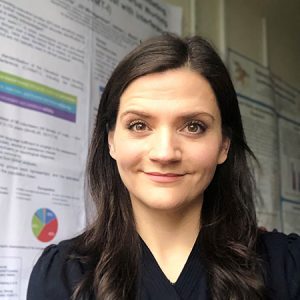

The official meeting venue and headquarter hotel is the New Orleans Marriott. All events occur at the hotel, making it the preferred lodging choice. INS has reserved a block of rooms at a special rate exclusively for INS meeting attendees.
The hotel is centrally located in the heart of the city’s famed French Quarter, and is within walking distance of premier attractions such as Jackson Square and the world-famous Bourbon Street. Louis Armstrong New Orleans International Airport, the arrival point for most attendees, is located 13 miles from the hotel.
Hotel booking information will be available when registration opens, typically in October.

Jessica Fish, PhD
Program Co-Chair

Vonetta Dotson, PhD
Program Co-Chair
We are thrilled to return to New Orleans for the first time since 2017! This wonderfully diverse and resilient city provides an ideal setting for our conference themes. We look forward to an inspiring scientific program and hope you will join us to experience the rich array of offerings in food, culture, and the arts that make New Orleans such a unique city!
Please bookmark this page for additional meeting highlights over the upcoming months!
Over the past decade, public interest in brain health has surged. Concurrently, neuropsychology research and practice have broadened their scope to not only address brain-based disorders and understand healthy cognitive functioning, but also promote brain health. This involves optimizing brain functioning across cognitive, emotional, behavioral, and motor domains in both healthy and clinical populations. This broader perspective redefines the role of neuropsychologists, emphasizing prevention, quality of life, and overall well-being, thus enhancing our impact worldwide.
Neuropsychology has a responsibility to ensure that this impact is felt equitably across all individuals and communities. It has long been recognized that social determinants affect brain health, with some communities facing higher risks for negative brain health outcomes and greater obstacles to quality healthcare and behaviors that support brain health. Now, it is imperative to move beyond merely acknowledging these inequities and actively work to reduce them. Central to this effort is conducting translational research that directly benefits brain health and promotes brain health equity. These considerations inspired the theme for the 2025 Annual Meeting in New Orleans: Translational Science for Brain Health Equity
We invite abstract submissions aligned with this theme, including those that explore social determinants affecting the risk, assessment, and treatment of neuropsychological conditions; provide insights into interventions and the optimization of brain health; or address the implementation of research into neuropsychological service delivery. We particularly encourage submissions that focus on minoritized and underrepresented groups, such as racially and ethnically minoritized populations, LGBTQ+ individuals, low socioeconomic groups, and rural communities. Acknowledging that brain health is a lifelong process, and that age is a key diversity consideration, we welcome submissions that incorporate a lifespan perspective and those addressing the intersectionality of age with other diversity aspects. As in previous years, we also encourage submissions that offer unique insights into the neuroscience of healthy and disease states, innovations in measurement and assessment, novel applications of technology in our field, and international perspectives and collaborations.
Programming includes keynote speakers and invited symposia on research, practice, and professional development topics including:
Abstract submission is now open! Please read ALL submission guidelines and available presentation formats carefully before you submit. Submissions that do not adhere to posted guidelines may not be considered. Download the Call for Abstracts PDF or continue reading below for complete submission details.
Opens: June 6, 2024
Deadline: August 15, 2024
Authors may submit individual abstracts for Poster or Paper consideration, or a complete Symposium Proposal, which consists of a symposium summary (submitted by the chair) plus 4-5 linked abstracts.
Each abstract must be submitted under one of the categories listed below. Each abstract must also select at least one (or a maximum of up to three) relevant keyword(s).
NEW for 2025! The INS Special Interest Groups (SIGs) will be highlighting selected paper and poster abstracts related to their interest areas at NOLA 2025. To be considered, please include the relevant SIG name as a keyword during the submission process (scroll to keywords beginning with “SIG” to see the complete list).